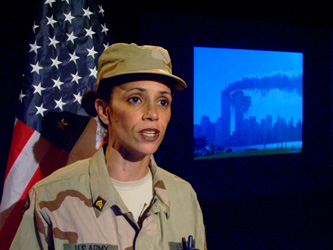Coco Fusco, A Room of One's Own: Women and Power in the New America, 2006.
Born 1960 in New York, New York; lives in New York, New York
Coco Fusco is an interdisciplinary artist, writer, and curator whose practice includes video, performance, and lectures. Born to Cuban and Italian parents, she often explores the dialogue between identity, globalization, technology, gender, and race. In the quasi-documentary film a/k/a Mrs. George Gilbert (2004), she navigates the racial politics dictating the FBI’s intense 1970 hunt for African-American activist Angela Davis. Fusco focused on the subtleties of hierarchy and power as co-curator of Only Skin Deep: Changing Visions of the American Self, a photography exhibition organized by New York’s International Center of Photography in 2003 illustrating how images construct and perpetuate racialized vision.
In her video Operation Atropos (2006), Fusco examines the mechanics of the interrogation process. She invited six women to participate with her in the Prisoner of War Interrogation Resistance Program, a course designed by former members of the United States military to prepare private clients for the “psychology of capture.” The immersive program is structured to replicate a military interrogation as “captors” attempt to force confession of a prearranged shared secret from “prisoners.” The group is driven into the woods, ambushed by hooded men, strip-searched, and subjected to verbal and psychological abuse. While the instructors do not use physical violence, they threaten and insinuate it. Exploiting gender and racial differences functions to isolate prisoners, but most effective is the suggestion of retaliation on others in the group, as interrogators lead resistant captives to believe that nearby screams of pain are coming from fellow prisoners. Fusco notes that this tactic is particularly useful against women. As the scenario unfolds, the line between reality and playacting blurs. The women are prodded and pushed until four of the seven reveal their secret. Afterward, the former prisoners are instructed in the art of interrogation: they are taught to do to others what has been done to them.
The power of the interrogation process is evident— as prisoners, one of the women is reduced to tears, another to fury. The implicit undertone—the nearcertain conclusion in an environment where the threat of death or violence is real—is compelling, and the possibility that any non–trained professional could withstand the pressure seems minimal. Titling the work Operation Atropos, after the Greek Fate who determined how each mortal would die, the artist refers to the similarly inevitable results of these operations. Fusco’s timely video suggests a corollary in contemporary political dynamics, alluding that confessions forced under duress within the bounds of military guidelines seem equally predetermined and inescapable. STACEY GOERGEN
Coco Fusco, A Room of One's Own: Women and Power in the New America. Performance, P.S. 122, New York, 2006.

























